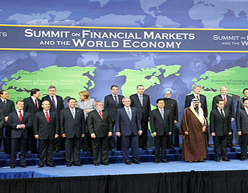Russian leadership expresses satisfaction over Washington G20 summit outcomes

The Russian president, Dmitry Medvedev, has expressed satisfaction over the outcomes of the meeting of the world’s 20 largest economies, now commonly referred to as G20, over the weekend in Washington to work out measures to address the devastating financial crisis that has already wreaked unprecedented havocs across the earth and prevent its reoccurrence in the future.
Commenting on the declaration and principles drafted during the 20-nations summit, which, de-facto, has elevated the emerging economies to the pinnacle of global decision making on key world economic issues, President Medvedev noted that he was satisfied with results of the summit. “I’m satisfied with the results of the G20 Summit in Washington,” the Russian president told the U.S. Council on Foreign Relations, where he also fielded some questions after the economic meeting. "Crisis does not have only negative aspects, but also certain positive sides. One of these is the possibility for heads of the world's largest economies to gather together and review global issues at the most authoritative level and set up a new international financial architecture."
At the G20 meeting, the summiteers, who, apart from the leaders of the world’s traditional economic powerhouses, such as the United States, EU states, Japan and Russia, also included the leaders of the so-called ‘fast-growing emerging economies’ such as China, India, Brazil, South Africa and a host of others, agreed to radically overhaul the global financial architecture, including the institutions borne from the Bretton Woods Agreement, such as the World Bank, IMF and other financial structures that have so far failed to rein in the current crisis, to make them reflect the changes in the world and much more ‘responsive’ to the modern challenges in global economy.
Briefly put, the G20 plans to fix the global financial mess envisage working in three key directions, notably, support of economies and financial markets, creation of new instruments for effective regulation of the economy and embarking on reformation of global management systems. All these will be realized through the plan of actions adopted by the summiteers, which include boosting the level of transparency and accountability, increasing the level and quality of effective regulation on the global financial markets, boosting the level of international cooperation and reforming the international financial institutions.
Some of the plans, according to the declaration, need to be urgently implemented, while the progress report on the results of their execution should come up for review by March 31, 2009, when the G20 planned to meet again, this time in the Great Britain or Japan, where the summiteers will be joined by the new U.S. president, Barack Obama, who, for obvious reasons, was absent at the Washington summit on November 15.












 Web design,
Web design,